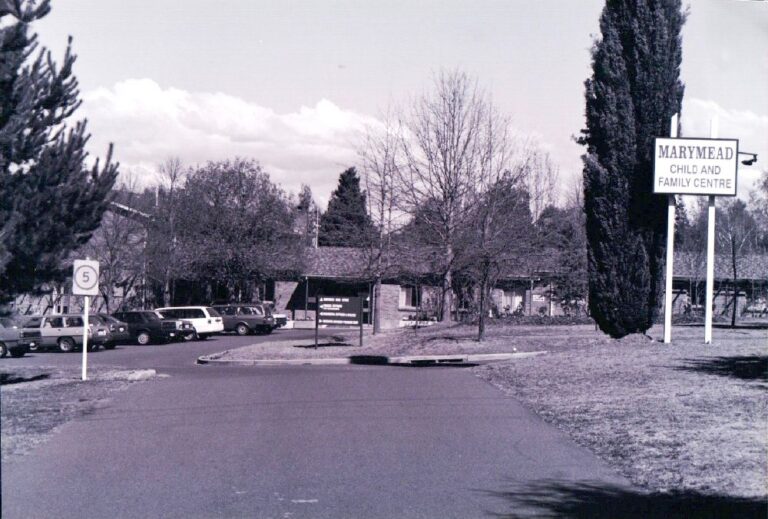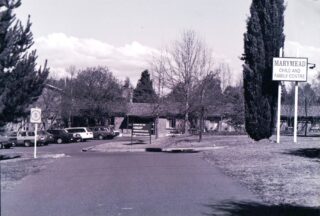- Entry type: Organisation
- Entry ID: AWE4865
Marymead Child and Family Centre
(From 1967 – )
- Occupation Children’s welfare services
Summary
The Franciscan Missionaries of Mary established Marymead Children’s Centre (now Marymead Child and Family Centre) in 1967 as a specialised facility to provide residential care for children of families in temporary crisis. In the early years this might include a mother in hospital, a family breaking up, a child neglected or in danger. As the city grew rapidly so did demand for government-funded social services to provide for more complex needs requiring professional as well as community support. The Franciscan Missionaries of Mary withdrew from Canberra in 1986, transferring ownership of Marymead to the Catholic Archdiocese of Canberra and Goulburn. Since then, the agency has grown steadily, staffed by professional welfare workers (predominantly female), to become one of the major social services agencies in the ACT. By 2012 it was providing support, in the home and through out-of-home care, to vulnerable and disadvantaged children and their families across the Australian Capital Territory and the surrounding New South Wales region.
Details
Canberra grew rapidly after World War 2 as public service departments were moved to the capital (especially from the 1960s). The rapidly growing population was young: throughout 1950-1975, almost 40% of the population was under 21. Few people had an extended family base nearby to help with family burdens or crises, and social networks were insufficient to compensate for that lack. Moreover, government policy, specialist social services and funding for welfare assistance did not keep pace with the rapid growth in population and complexity of needs for support.
One area particularly poorly served in the 1950s was provision of support for children who could not live with their parents or other family members due to a temporary crisis or longer term problems caused by poverty, illness, neglect, domestic violence or family breakup. Such care and protection services as existed were provided by New South Wales, and Canberra had no facility of its own to provide long or short term out-of-home care or specialist support for children and teenagers. Pressure was increasingly exerted on the Commonwealth government by local magistrates, church members and, indeed, leading public servants and their wives, to address the obvious need for such services.
An early change came in 1963 when Dr Barnado’s Homes opened a group house but, from the outset, it could not keep up with demand. About the same time, the Franciscan Missionaries of Mary (FMM) proposed to open a house in Canberra and undertake welfare work, especially among the poor. The FMM were founded in India in 1872 and came to Australia in 1942; their work focused on the poor and disadvantaged in society. They proposed a centre in Canberra which would provide out- of-home care for children of families in temporary crisis, plus a hostel for young working women coming to Canberra to join the public service (this was intended to provide a continuing income stream but, however, was never built).
Seven nuns arrived in January 1963, moving initially into a house and backyard caravan in the suburb of Narrabundah. The first superior was Mother Columcille, a dynamic, formidable 70-year-old Irish nun who became famous for her determination and selective deafness to responses (especially from public servants) that were not the ones she wanted. She quickly obtained the support of several senior public servants well-positioned to persuade relevant ministers (including the Prime Minister, Bob Menzies, Senator John Gorton, and Doug Anthony who all became Marymead supporters) to adopt and fund the proposal for a child welfare and hostel facility to be called Marymead (‘Mary’s meadow’ in Gaelic). Their wives, meanwhile, began fund raising activities, forming the Marymead Auxiliary which continues in strength into the 21st century.
By the mid-1960s the Commonwealth had assumed responsibility from NSW for directly funding and overseeing welfare services in the ACT but the funding levels and arrangements were greatly affected (into the 1990s) by differences of opinion on the extent to which government should directly manage welfare services or outsource them to charitable organisations. In the 21st century, government policy has settled firmly on the outsourcing model, typically within stringent government guidelines.
In 1965 the Commonwealth finally agreed to provide funding towards establishment by the FMM of a child welfare centre and land was allocated in Narrabundah. Marymead opened in 1967 with a convent and six residential cottages, each with a house mother and up to a dozen children, led by the Centre administrator, Sister Rosalie McNaughton (Mother Columcille, her indomitable foundation work completed, retired to Ireland). The house mothers were the nuns and, over time, a number of lay women as well. Gardens were created with help from a local Lions Club, the children began to attend local schools, and a family-like community was created.
By 1980 the nuns estimated they had cared for over 5,000 children, predominantly through periods of residential care at Marymead. The nuns themselves now included a professional social worker, a sign not only of increased complexity in the needs to be met but also of higher standards being set by the government in relation to expertise and qualifications of those working in the welfare sector.
Under the nuns, Marymead’s primary function was to welcome children of all races and religions who required care. Children were admitted in various times of crisis including distress following accidents or sudden illness, poverty, a parent hospitalised, a family break up, disruption of the home or child abuse or neglect. Children were either placed voluntarily by parents or referred by welfare or health officials. Occasionally the police would also bring children to Marymead at night or over the weekend if a sudden emergency arose.
Funding continued to be a major constraint through the 1960s and 1970s: real costs per child rose as salaries and living costs increased and the need increased for professionally trained personnel who could provide appropriate support to children with challenging behaviours or complex needs. By the early 1980s, the FMM’s own priorities in Australia turned more to health and aged care services. This, combined with significant financial difficulties in operating Marymead, led the nuns to withdraw from Canberra in 1986. Marymead then came under the auspices of the Catholic Archdiocese of Canberra and Goulburn.
From the late 1980s more and more attention was paid to supporting children at home, in their family contexts. One of Marymead’s great strengths in the last 20 years has been its emphasis on an integrated approach to supporting both the child and the family as a whole. This strength has been accompanied by steady and substantial growth in the number of clients, number and variety of services offered, and introduction of innovative strategies that have influenced government policy trends in social services. By 2011 Marymead was, inter alia, overseeing a large foster care program, disability support programs, residential care for young people with high and complex needs, child protection support, programs for families in trauma or having broken up, support for carers, counselling services, and family skills programs.
Marymead has remained a community-based, not-for-profit agency whose primary concern is to care for vulnerable and disadvantaged children and their families (over 1000 a year by 2011). As is common throughout the social services sector, its workforce has mostly been women. It has become an integral part of the Canberra community, touching the lives of a large proportion of the population either directly or behind the scenes or through its fundraising activities.
Archival resources
Digital resources
Published resources
-
Report
- Annual Report 2010-2011, Marymead Child and Family Centre, 2011, http://www.marymead.org.au/publications
-
Site Exhibition
- From Lady Denman to Katy Gallagher: A Century of Women's Contributions to Canberra, Australian Women's Archives Project, 2013, http://www.womenaustralia.info/exhib/ldkg
- Resource
